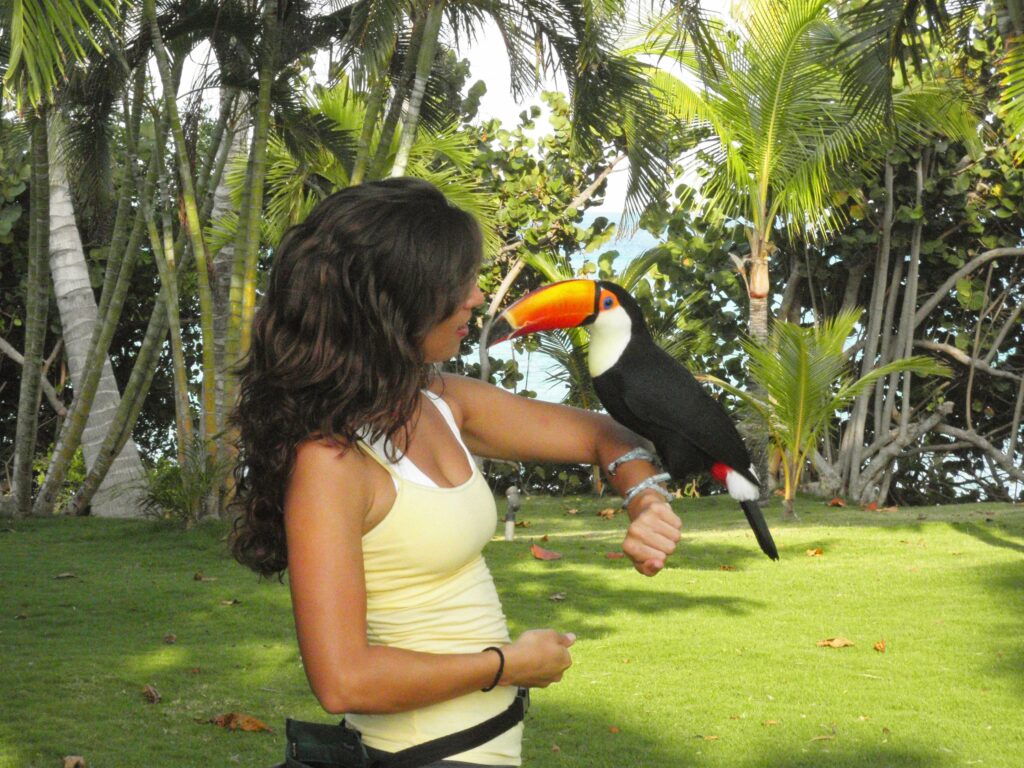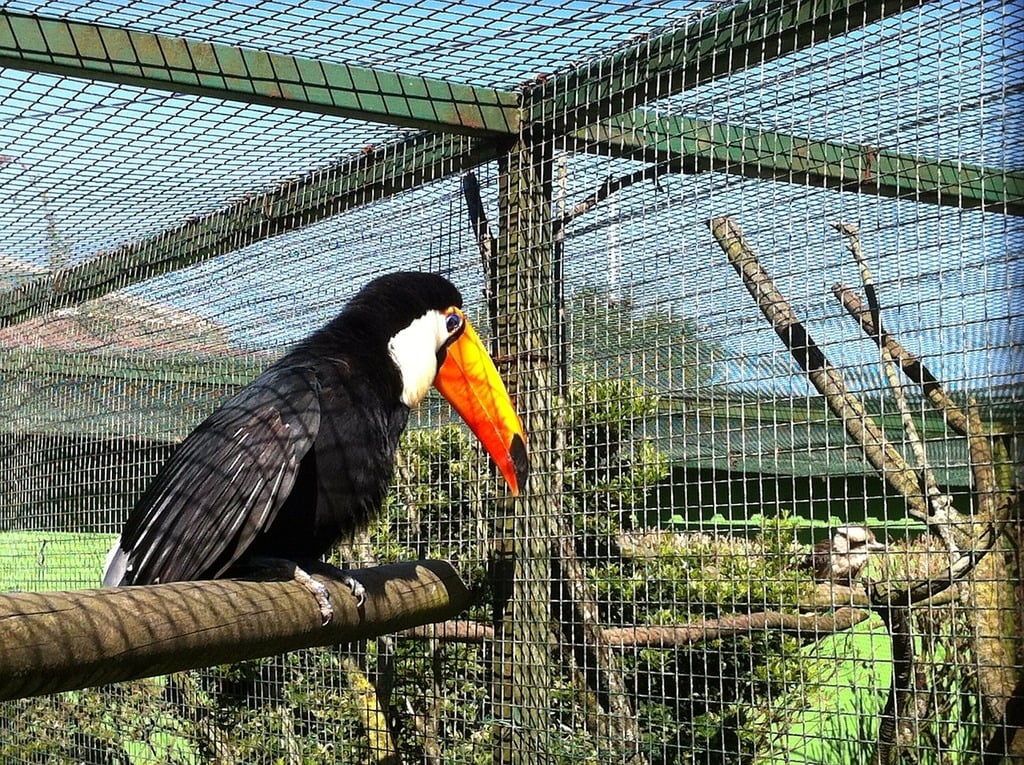Toucans, with their striking beaks and vibrant plumage, are among the most visually captivating birds on the planet. Native to Central and South America, these birds have intrigued bird enthusiasts worldwide. While toucans are often associated with the wild, they can also make unique and fascinating pets. However, keeping a toucan bird pet comes with its own set of challenges and responsibilities. This guide will provide you with everything you need to know about caring for a toucan bird pet, including their behavior, diet, housing, and overall care.
1. Understanding the Nature of Toucan Birds
Before bringing a toucan into your home, it’s important to understand their nature. Toucans are highly social and intelligent birds, known for their playful and curious behavior. Unlike many other pet birds, toucans do not typically mimic sounds or speech, but their personalities more than make up for it.
- Social Behavior: Toucans are social creatures that enjoy interacting with their human caregivers. They can form strong bonds with their owners and other birds. In the wild, toucans are often seen in small flocks, which means they thrive on social interaction and should not be left alone for long periods.
- Playful and Curious: Toucans are naturally curious and love to explore their environment. They are also quite playful, often engaging in activities like tossing objects around or investigating new toys. Their playful nature makes them entertaining companions, but it also means they require constant mental stimulation to prevent boredom.
- Intelligent and Sensitive: Toucans are intelligent birds that can be trained to perform simple tricks and behaviors. However, they are also sensitive creatures and can become stressed or anxious if their environment or routine is disrupted.

2. Choosing the Right Toucan Species for a Pet
There are several species of toucans, each with its own characteristics and care requirements. Some species are better suited for life as a toucan bird pet than others.
- Toco Toucan: The Toco Toucan is the largest and most recognizable species, known for its bright orange beak. While stunning, they require a significant amount of space and are more challenging to care for due to their size.
- Keel-Billed Toucan: Slightly smaller than the Toco, the Keel-Billed Toucan is also a popular pet choice. They are known for their colorful beaks and playful nature.
- Aracari Toucan: Aracari Toucans are smaller and generally more manageable as pets. They are known for their friendly disposition and adaptability to captive environments.
- Toucanets: Even smaller than the Aracari, Toucanets are the most manageable species for pet owners. They still retain the vibrant colors and charming personalities of larger toucans but require less space and care.
When choosing a toucan species, consider your living space, experience with birds, and ability to meet their care requirements.
3. Housing and Environment for Toucan Birds
Proper housing is crucial to the well-being of your toucan bird pet. These birds require a spacious and stimulating environment to thrive.
- Cage Size: Toucans need a large cage that allows them to move around freely. The cage should be at least 6 feet in height, 4 feet in width, and 4 feet in depth. The bars should be strong and spaced closely enough to prevent the bird from getting its head stuck.
- Enrichment and Toys: Toucans are active birds that need plenty of enrichment to stay healthy and happy. Provide a variety of toys, including chew toys, puzzle feeders, and objects that encourage foraging behavior. Rotate toys regularly to keep your toucan engaged.
- Perches: Toucans are not strong climbers, so their cage should have perches at various heights. The perches should be made from natural wood to help maintain their beak and claws. Provide different diameters of perches to keep their feet healthy.
- Environmental Considerations: Toucans are sensitive to temperature changes and require a stable, warm environment. Keep the cage away from drafts, direct sunlight, and air conditioning vents. The ideal temperature for toucans is between 65°F and 85°F (18°C to 29°C).
- Flight Space: If possible, provide your toucan with a safe area where they can fly and exercise outside of their cage. A bird-safe room or aviary is ideal. Regular flight time is essential for their physical and mental health.
4. Diet and Nutrition for Toucan Birds
A balanced diet is essential for the health and longevity of your toucan bird pet. Toucans have specific dietary needs that differ from other birds.
- Low-Iron Diet: Toucans are prone to a condition called hemochromatosis, where excess iron accumulates in their body, leading to health problems. To prevent this, they require a low-iron diet. Avoid feeding them foods high in iron, such as certain fruits and vegetables.
- Fruit-Based Diet: The majority of a toucan’s diet should consist of fresh fruits, such as papaya, melon, grapes, and bananas. Fruits should be washed thoroughly and cut into small, manageable pieces. Avoid citrus fruits, as they can interfere with iron absorption.
- Pelleted Diet: Along with fresh fruits, toucans should be fed a specialized low-iron pelleted diet. These pellets are designed to meet their nutritional needs and should be a staple part of their diet.
- Supplements: Occasionally, your toucan may need supplements to ensure they are getting all the necessary vitamins and minerals. Consult with an avian veterinarian to determine the appropriate supplements for your bird.
- Water: Provide your toucan with fresh, clean water at all times. Change the water daily to prevent contamination. Toucans may also enjoy bathing in shallow water, so provide a shallow dish for them to splash around in.
5. Health Care and Common Issues in Pet Toucans
Keeping a toucan bird pet healthy requires regular veterinary care and attention to their specific health needs.
- Regular Check-Ups: Schedule regular check-ups with an avian veterinarian who is experienced with toucans. Regular visits will help detect any potential health issues early and ensure your toucan is in good health.
- Beak and Claw Care: Toucans have large beaks that require regular maintenance. Provide natural wood perches and chew toys to help them keep their beak in good condition.
- Feather Care: Toucans preen their feathers to keep them in good condition. Provide a shallow dish of water for bathing and mist them with water to help maintain feather quality. If you notice any issues with their feathers, such as bald spots or discoloration, consult your veterinarian.
- Monitoring for Hemochromatosis: Due to their susceptibility to hemochromatosis, monitor your toucan for signs of iron overload, such as lethargy, weight loss, or loss of appetite. Regular blood tests may be necessary to check their iron levels.
6. Bonding and Interaction with Your Toucan Bird Pet
Building a strong bond with your toucan bird pet is one of the most rewarding aspects of keeping these birds. They are social animals that thrive on interaction with their human caregivers.
- Social Interaction: Spend time interacting with your toucan every day. Talk to them, offer them treats, and engage them in play. Toucans enjoy social interaction and can become lonely or stressed if left alone for too long.
- Training: Toucans are intelligent birds that can be trained to perform simple tricks and behaviors.We must use positive reinforcement techniquesTraining sessions should be short and enjoyable for both you and your toucan.
- Understanding Behavior: Learn to recognize your toucan’s body language and vocalizations. Toucans can be expressive, and understanding their signals will help you respond to their needs and build a stronger bond.

7. Legal and Ethical Considerations
Before acquiring a toucan bird pet, it’s essential to understand the legal and ethical implications of keeping one.
- Legal Requirements: In some areas, keeping a toucan as a pet may require special permits or licenses. Research local laws and regulations to ensure you are in compliance before bringing a toucan into your home.
- Ethical Considerations: Toucans are exotic birds that are often captured from the wild. Ensure that any toucan you consider as a pet was bred in captivity and obtained through ethical and legal means. Supporting responsible breeding practices helps protect wild populations and ensures the welfare of the birds.

toucan bird pet
8. Conclusion: Is a Toucan Bird Pet Right for You?
Toucans are extraordinary birds that offer a unique and rewarding pet experience. However, they require a significant commitment in terms of time, space, and care. If you are prepared to meet their needs and provide them with a stimulating and loving environment, a toucan bird pet can be a delightful addition to your life.
With their vibrant personalities, stunning appearance, and affectionate nature, toucans can bring joy and companionship to any household willing to take on the responsibility of caring for these magnificent birds.
